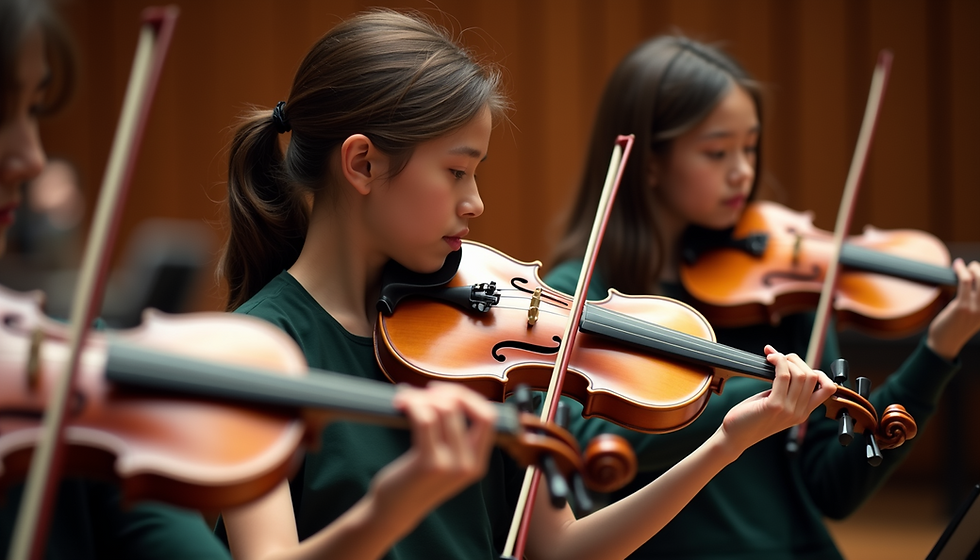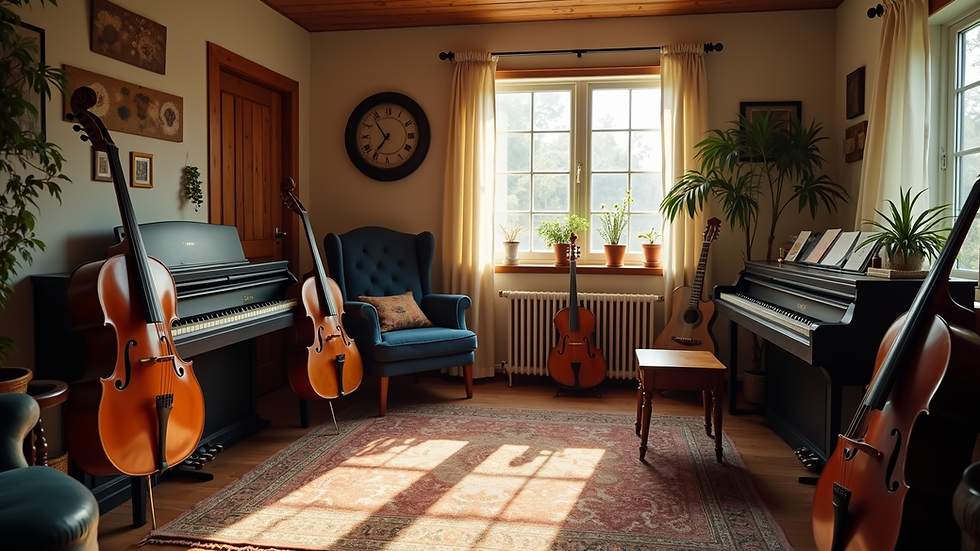How to Choose the Right Music School for Your Child
- Celia Zhang
- Jul 28, 2025
- 4 min read
Selecting the perfect music school for your child can be a game-changer in their musical journey. With a wide range of options available, understanding your child's unique needs and preferences is crucial to discovering the right environment for their growth. This guide offers practical steps and considerations to help you make an informed choice.
Understand Your Child's Interests
Start by identifying your child's musical interests. Do they prefer classical symphonies or the energy of rock music? Perhaps they're curious about jazz, or they have their heart set on learning the guitar or piano.
Taking the time to explore these interests will aid your search for a suitable music school while also giving your child a sense of ownership over their musical education. For instance, you might take them to a local concert or encourage them to try out several instruments. Engaging them in these conversations can reveal their enthusiasm and direct your decision-making.
Evaluate Teaching Methods
Teaching methods vary widely from one music school to another. It is crucial to assess these methods to ensure they align with how your child learns best. For example, some schools offer traditional classical training, while others might emphasize modern pop styles or improvisation techniques.
Consider visiting schools for introductory sessions or observing classes. This allows you to understand how instructors engage with students. A positive teacher-student relationship often leads to a more motivating and enjoyable learning experience for your child.
Research the Curriculum
Reviewing the curriculum is another vital step. Look for schools that balance performance opportunities with music theory and ear training. A varied curriculum can better equip your child with comprehensive skills.
For example, a school that offers group lessons, master classes, and multiple performance showcases can significantly enhance your child's experience. According to a study by the National Association for Music Education, students involved in group performances report a 30% increase in confidence compared to those who do not participate.
Consider the Instructor's Experience
The experience and qualifications of instructors can heavily influence your child’s learning. Investigate the backgrounds of potential instructors to ensure they are qualified and their teaching philosophies align with your child's needs.
For instance, a teacher with extensive performance experience can provide insights into real-world applications of music. Don't hesitate to ask schools for information about their teaching staff's credentials and their approaches to student engagement.
Look at the School's Environment
The environment of a music school plays a significant role in shaping your child's overall experience. Seek out a school that promotes a creative and supportive atmosphere.
Visiting the school can give you a feel for its culture and environment. Are the facilities clean and well-maintained? How do current students and parents describe their experiences? Engaging with them can provide a clearer picture of what to expect.
Assess Flexibility and Accessibility
Logistics should also factor into your decision. Consider the school's schedule. Is it flexible enough to accommodate your child's other commitments, such as sports or academic activities?
Accessibility is essential too. A school located close to home can make it easier for your child to attend lessons consistently. This convenience minimizes stress from long commutes, enabling your child to focus more on their musical education.
Investigate Performance Opportunities
Performance opportunities can significantly enrich your child’s learning journey. Getting involved in recitals, competitions, or ensemble work can boost confidence and improve stage presence.
Inquire about the frequency of performances offered by the school. Statistics show that students who regularly participate in performances are 25% more likely to stay engaged with their music studies over multiple years.
Gather Feedback from Other Parents
Talking to other parents can offer valuable insights into the pros and cons of different music schools. Attend local music events, join community forums, or simply reach out to friends for recommendations.
Collecting feedback can reveal important aspects of the school that may not be evident during a visit. Don't hesitate to ask about both positive experiences and any challenges faced.
Consider the Cost
Music education can vary widely in cost, so it's vital to understand your budget. Investigate tuition fees and what they include. Inquire about additional expenses, like instrument rentals, books, and performance fees. Knowing the total financial commitment will help you make well-informed decisions without sacrificing quality.
Trust Your Instincts
Lastly, trust your instincts as a parent. You know your child better than anyone else. If a school feels like a good fit, it probably is.
Visit several options, interact with faculty, and observe classes to see where your child would thrive. The best choice will align with your child’s interests, learning style, and your family’s values.
The Final Decision
Choosing the right music school for your child is a significant decision that can greatly impact their love of music and overall development. By understanding your child's interests, evaluating teaching methods, and researching available facilities, you can find a school that helps nurture their passion for music.
Being proactive in your research and trusting your instincts will lead you to a nurturing and engaging musical environment. With the right support, your child can flourish as a budding musician and enjoy a lifelong love of music.






Comments